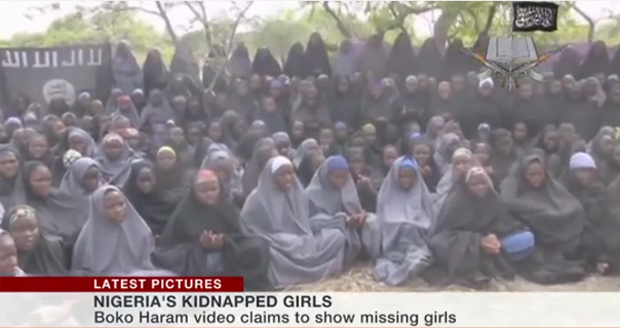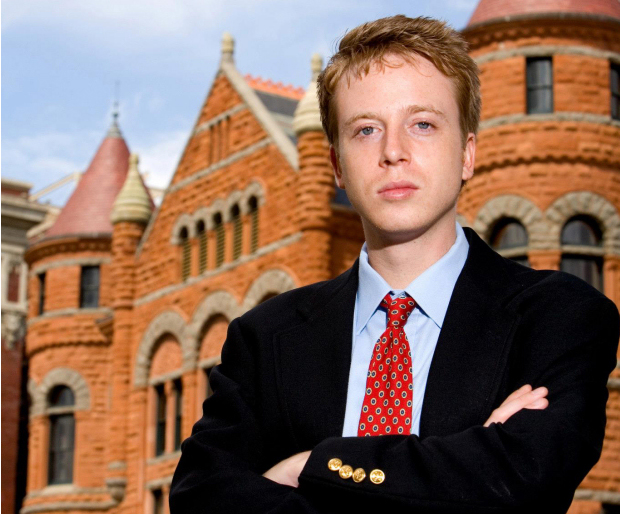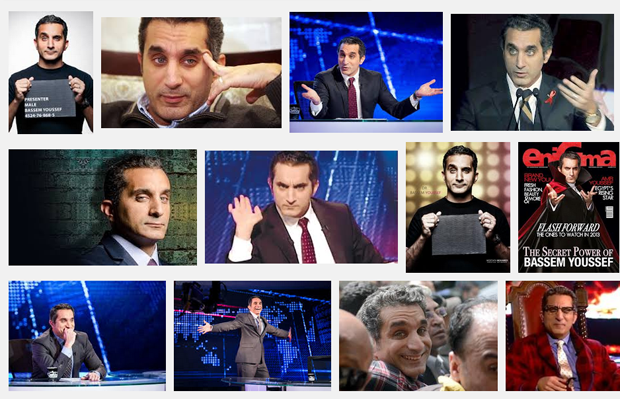3 Jun 2014 | News and features, Nigeria, Politics and Society, Religion and Culture

(Photo: BBC via YouTube)
The Nigerian government has faced criticism over their crackdown on Boko Haram, the terrorist group among other things responsible for the recent kidnapping of around 276 school girls from Chibok in Borno state. The efficiency of the state’s strategy, which has included extrajudicial executions, mass imprisonments and indiscriminate targeting of any young Muslim Nigerian who might fit the profile of a Boko Haram member, has been questioned — and the “war on terror” has also been used to target the country’s journalists.
In the first half of 2013, according to Amnesty International, over a thousand detainees, many of whose affiliation with Boko Haram was never confirmed, died in police detention. The human rights organisation has condemned the government’s crackdown. Borno, Yobe and Adamawa states were put under a state of emergency, countless homes, businesses and mosques were raided, and thousands of men and boys were arrested, loaded into trucks and thrown in prison. According to many of their families, the arrests have been indiscriminate.
In 2009, Nigerian police claimed the killing of Mohammed Yusuf, the leader of Boko Haram at the time. The government said Yusuf, who was blamed for violence that killed hundreds of people in northern Nigeria, was shot dead following his capture. The official line was boldly unrepentant about the lack of judicial process. “He has been killed. You can come and see his body at the state police command headquarters,” said Isa Azare, spokesman for the police command in the northern city of Maiduguri.
In 2010, footage obtained by Al Jazeera showed deceased and unarmed Boko Haram prisoners who appeared to have been killed by government troops after “crackdown” fighting had ended. Elements of the police and army reportedly staged a follow-up operation in which house-to-house searches were conducted and individuals were apparently selected at random and taken to a police station.
The efficiency of the government’s strategy to eliminate Boko Haram has been severely questioned by security experts.
“So many young men were killed and beaten in the crackdown against Boko Haram,” said Virginia Comolli, Research Fellow for Security and Development at the International Institute for Strategic Studies, “ that police or soldiers might have developed sympathies for the group, if one of their relatives was caught up in this.”
“You wonder whether there could be complicity,” Comolli speculated.
Bala Liman, a PhD candidate at School of Oriental and Africa Studies in London and an expert on Boko Haram, pointed to further flaws in the crackdown. “Look at the $8 billion which was provided to the security forces in 2011,” he said, “most of the money was lost to corruption rather than going to fight Boko Haram. Most of the soldiers I speak to nowadays are still under-equipped.” With corruption so widespread, Liman also suggested that bribery could have been a motivation behind collusion with Boko Haram.
While international observers may have the luxury of pointing out the fallacies in such a brutal crackdown, as well as corruption (or sheer incompetence) amongst the police and military, Nigerian journalists do not: Security agents have abused the pretext of their own “war on terror” to threaten, harass, arrest, detain, and seize the equipment of local reporters.
In one case in December 2013, security forces assaulted broadcast journalist Yunusa Gabriel Enemali on the pretext he was a Boko Haram suspect, after he took photographs of a policeman demanding a bribe. “I was fortunate to come out alive,” Enemali told the Committee to Protect Journalists at the time.
In December 2012, the State Secret Service (SSS) unlawfully detained and seized the equipment of Aliyu Saleh, a reporter with the weekly Hausa-language Al-Mizan newspaper, and Musa Muhammad Awwal, the paper’s editor, allegedly over a story questioning the government’s extra-judicial imprisonment of people in Northern Nigeria.
Peter Nkanga, the Commitee to Protect Journalist’s West Africa correspondent, told Index on Censorship: “Awwal was twiced arrested and on both occasions had his equipment seized by the State Security Service. It is now over a year ago yet the SSS have refused to return his two laptops and two phones, alongside five other phones seized from his wife and children.”
Journalists covering protests since the kidnap of the Chibok schoolgirls have also been targeted. Hir Joseph of the independent Daily Trust newspaper was arrested on 9 May after he wrote a story detailing how female police officers and other security officers had joined with protesters calling on the government to do more to rescue the girls.
“Joseph refused to disclose his source for a story,” Nkganga told Index. While in custody, two police officers kicked Joseph, locked him in a cell “with hardened criminals” and was also told to simulate sex with a wall while being interrogated. The police charged Joseph in court on 12 May, accusing him of publishing “injurious falsehood”. Joseph pleaded not guilty and the case has been adjourned to 19 June. He faces up to two years imprisonment if convicted.
“Targeting a journalist for reporting on issues of public interest,” says Nkganga, “is tantamount to deliberately denying the public the right to be adequately informed about issues affecting their commonwealth. This is an attack on the society. By extension, this goes against the freedom of expression Nigerians are universally and constitutionally guaranteed.”
This article was posted on June 3, 2014 at indexoncensorship.org
9 May 2014 | Digital Freedom, News and features, Politics and Society, United States

(Image: Free Barrett Brown)
Last Tuesday “hacktivist journo” Barrett Brown pled guilty in a US court after a long-running battle with the FBI. He had reported on a high-profile Anonymous hack as well as posting provocative videos on YouTube baiting FBI officials.
At the hearing, the court reduced his sentence from 105 years to eight and a half years, with lawyers saying he could serve far less time.
Both Brown’s defence team and freedom of speech activists are now worried a precedent has been set in which reporters could be prosecuted for writing stories using hacked information.
“The implications are worrisome in the extreme,” said Kevin Gallagher, director of Free Barrett Brown Ltd.
“It must be noted that Brown’s lawyers worked painstakingly to avoid setting an undesirable precedent—one that would place other journalists at risk for dealing with hackers as sources.
“Yet the dangers of this novel legal construction are clear: journalists may be prosecuted for merely speaking to hackers and having knowledge of their breaches.”
Last month US prosecutors dropped 11 of the 17 charges against Brown, who faces three separate indictments. The abandoned claims all related to a breach of private intelligance contractor Stratfor carried out by Anonymous in 2011.
The ringleader of the Anonymous hackers, Jeremy Hammond, was sentenced to 10 years in prison last November.
Brown’s case was criticised by freedom of speech campaigners because it involved him hyperlinking to stolen Stratfor data which had already been made publicly available. Concerns revolved around how one of the core tenets of the internet – link sharing, could be impacted.
“The attempt to criminalize the act of providing links broke new ground in dangerous official absurdity,” said Norman Solomon, an American journalist associated with media watchdog Fairness & Accuracy in Reporting.
No explanation was given by the FBI or prosecutors as to why the charges were suddenly dropped.
Once the gagging order was lifted it was revealed that Brown had in fact advised the Anonymous hackers to redact the data, even contacting the Stratfor CEO to tell him this.
Brown wrote in an email to Anonymous : “It occurred to me that it might be a good idea to tell Stratfor that you guys will consider making any reasonable redactions to emails that might endanger, say, activists living under dictatorships with whom they might have spoken… If they fail to cooperate, it will be on them if any claims are made about this yield endangering anyone”.
According to Gallagher one of Brown’s lawyers commented :”He was very critical of careless releases of data by hackers, but he made efforts to protect his sources; and that’s what he’s being charged for.”
The remaining charges constitute two felonies and one misdemeanour, with one charge of making an internet threat resting on aggressively presented YouTube videos that Brown posted of himself after he grew angry at the FBI’s treatment of his case. One clip was titled “Why I’m Going To Destroy FBI Agent Smith.” A description under the video called for tip-offs about the FBI agent to be sent to a specific email account. Brown pleaded guilty to the charge.
“Barrett expresses deep regret for what he did in making the threat, which he did impulsively at a time when he felt cornered and was unable to make rational decisions,” said one of the lawyers representing Brown, Ahmed Ghappour.
Brown was also prosecuted over obstructing the execution of a search warrant, and being an accessory to unauthorized access of a protected computer. He pleaded guilty to both these charges and will now face up to eight and a half years in prison.
Commenting on the final charge – Norman Solomon also told Index
“Journalists are now facing even more dangerous political terrain in the United States if they want to do real investigative reporting.”
“We should be greatly concerned that U.S. authorities have shown their determination to punish some journalists for putting together pieces of puzzles into coherent pictures.
He added, “In the context of internet journalism, a felony count against linking is akin to legal action against demonstrably thinking in unauthorized ways.”
This article was posted on 9 May 2014 at indexoncensorship.org
1 Apr 2014 | Egypt, News and features, Politics and Society

Dr Bassem Youssef, the former heart surgeon and Egyptian TV presenter likened to Jon Stewart, has declared he is taking extended time off from journalism, after an anti-semitism and plagiarism row swept through Egypt.
Dr Youssef was named by Time Magazine as one of the “100 most influential people in the world.” He has over two and a half million followers on his Twitter account and his weekly TV show, Al Bernameg, attracts millions. A political satirist and comedian, he is heavily influenced by Stewart’s Daily Show in the US.
Youssef’s self-censorship comes after a very public humiliation. The Cairo Post reports that an article written for publication in last Tuesday’s edition of Al Shoroqu, concerning events in Ukraine was heavily plagiarised a similar article Ben Judah wrote for Politico about the same topic.
The article was entitled “Why Russia No Longer Fears the West,” and while Ben Judah is a recognised global expert on Russia, Eastern Europe and Central Asia, Youssef is a pop-politics TV presenter with clearly scant knowledge of tensions with Putin.
Youssef tweeted that he had cited Ben Judah’s work at the end of his piece, but that editors had not include this in the final version.
Judah was then targeted by hundreds of anti-semitic messages, including pictures of Nazi symbols.
“Isreal [sic] under my shoes holocaust b***h lol hitler b***h hahahaha if I were hitler I will burn u all,” said one Cairo-based user.
Another from Cairo – “Jews curse of God on Earth.”
Another from Mansoura wrote “I will f**k your family one by one.”
“I made a public statement to lessen the damage on him as I respect his work for freedom of the press” Judah told Index. “Everyone can make mistakes under journalistic stress.” He received no apology from Dr. Youssef, even after the anti-Semitic tweets started arriving.
“Regarding the Twitter rage : I am from a family of Holocaust survivors, so it did not surprise me such hatred of Jews exists.”
Judah believes that the majority of the abusers were “middle class English-speakers in Cairo.”
“The whole experience reveals the scale of racial hate in the Arab world towards Jews,” he added.
In 1945 there were eight hundred thousand Jews living across the Arab world. Today, there are fewer than eight thousand.
Like Christians in the Middle East, who have seen their numbers drop from 15% to 5% in the last hundred years, the last fifty years saw many Jews move to Europe, the US, or Israel. The beginning of the exodus correlates roughly with the establishment of the state of Israel in 1948, suggesting that Arabs persecutions of Jews has also been politically motivated.
Judah says he received hundreds of anti-Semitic messages, many of them referencing the state of Israel.
“u re a f****** israeli dog &put ur tongue in ur ass f*** u son of pimp,” was one, another “I want to tell you f*** you Israel: F*** u Israelis and all Jews,” as well as “Israel under my shoes holocaust bitch lol hitler bitch hahahaha if I were hitler I wud burn you all.”
Judah also observed that many of those tweeting abuse had been key players in the Arab Spring.
“Egyptians who were baying for my Zionist blood were not peasants but mostly middle-class English speakers. Many of them were women, the heroes of the Arab spring.”
The anti-Semitism was not uniform, according to Judah “a lot of big Egyptian bloggers did touchingly tweet their shame and apologies to make me feel a bit better”.
This article was published on April 1, 2014 at indexoncensorship.org



